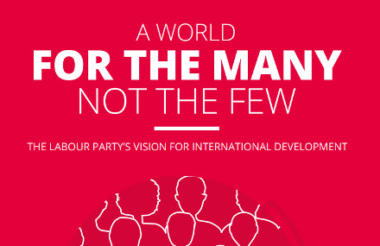The Labour Party has today published its vision for the future of international aid, saying it wants an end to a sector "based on charity rather than social justice”.
Kate Osamor, the shadow international development secretary, published A world for the many not the few, today, setting out 34 actions a Labour government would take to reform how aid is delivered, reverse some spending cuts and create new funds.
A Labour government would carry out a fundamental review of the Department for International Development. But the party also says that charities must also change how they operate.
She convened a task force of 12 experts and activists, acting in an individual capacity, and held six meetings between November 2017 and March 2018. In total 55 different civil society organisations (CSOs), unions, think tanks and individuals also submitted evidence.
Labour said it would “continue to honour” the commitment to spend 0.7 per cent of gross national income on aid and also reiterated its committed to repealing the Lobbying Act, as part of the paper.
It said the a view of international development that is “based on charity rather than social justice, is fundamentally unfit for purpose in the 21st century” and said more should be done to tackle the causes of inequality.
“The old logic of international development as charity from rich to poor - and as aid alone - has had its time,” the paper said.
Charities need to change
The report said that the recent sexual exploitation scandal highlighted “the appalling ways in which those made powerful by current aid practices can abuse their positions” and was “indicative of an aid system that has been incentivised by successive governments over many years to prioritise technocratic service delivery over redistributing power, challenging its abuse, and standing on the side of communities”.
It called for a “redistribution of power within the development industry itself”.
Labour said it wants to involve people in communities more and would create a Social Justice Fund to directly support civil society activists in the global South.
It would also set up a “permanent mechanism for civil society and activists from across the British public and global South countries to be consulted on government policy and improve people’s engagement in DFID’s work”
Reverse cuts to volunteering
Labour said it would reverse cuts to international volunteering programmes and “will restore ambitious development education and volunteering schemes that help hundreds of thousands of young people across the country to understand and tackle the root causes of poverty and inequality, as well as climate change.”
One of the polices outlined in the paper was to triple the amount of funding women’s organisations get over a five-year period “through a new funding mechanism”.
Move away from poverty porn
Labour also called for a shift in how aid is communicated.
It said: “We will revolutionise how DFID communicates about international development,” and “we will move away from a narrative of aid and charity and towards one of rights and international social justice”.
As part of this it will work with international aid charities to “raise standards on public engagement and fundraising”.
“That will include reducing the use of so-called ‘poverty porn’, that erodes the possibility of solidarity, and the use of communications that often mislead by failing to communicate the real causes of poverty.
‘An important contribution’
Tamsyn Barton, chief executive of Bond, said the report was “an important contribution” and that: “It is encouraging to hear voices from the global south reflected in their vision as we are well aware of the critical role southern civil society plays in responding to humanitarian crisis, as well as lifting their own communities out of poverty when provided with the support and resources needed.
She added that: “The policy paper also rightly links the importance of the UK using the sustainable development goals as the guiding vision when responding to international injustices in order to tackle global poverty, inequality and climate change. This is crucial to ensuring we see real transformative change in the lives of people facing these challenges today and tomorrow.”
|
Related articles












